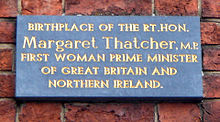Margret Hilda Thatcher
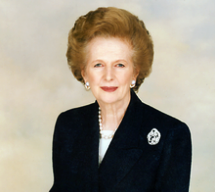
Remembering Margaret Thatcher, 1925-2013
The world lost one of its greatest champions of freedom in Lady Margaret Thatcher. Ed Feulner, Edwin Meese III, and Becky Norton Dunlop remember her contributions as a great leader and friend of The Heritage Foundation.
 Margaret Hilda Thatcher, Baroness Thatcher
Margaret Hilda Thatcher, Baroness Thatcher
LG, OM, PC, FRS (née Roberts, 13 October 1925 – 8 April 2013) was a British politician who was Prime Minister of the United Kingdom from 1979 to 1990 and the Leader of the Conservative Party from 1975 to 1990. She was the longest-serving British Prime Minister of the 20th century and is the only woman to have held the office. A Soviet journalist called her the “Iron Lady“, a nickname that became associated with her uncompromising politics and leadership style. As Prime Minister, she implemented policies that have come to be known as Thatcherism.
Originally a research chemist before becoming a barrister, Thatcher was elected Member of Parliament (MP) for Finchley in 1959. Edward Heath appointed her Secretary of State for Education and Science in his 1970 government. In 1975 Thatcher defeated Heath in the Conservative Party leadership election to become Leader of the Opposition and became the first woman to lead a major political party in the United Kingdom. She became Prime Minister after winning the 1979 general election.
After moving into 10 Downing Street, Thatcher introduced a series of political and economic initiatives to reverse what she perceived to be Britain’s precipitous national decline. Her political philosophy and economic policies emphasised deregulation(particularly of the financial sector), flexible labour markets, the privatisation of state-owned companies, and reducing the power and influence of trade unions. Thatcher’s popularity during her first years in office waned amid recession and high unemployment, until economic recovery and the 1982 Falklands War brought a resurgence of support, resulting in her re-election in 1983.
Thatcher was re-elected for a third term in 1987, but her Community Charge(popularly referred to as “poll tax”) was widely unpopular and her views on theEuropean Community were not shared by others in her Cabinet. She resigned as Prime Minister and party leader in November 1990, after Michael Heseltine launched a challenge to her leadership. After retiring from the Commons in 1992, she was given a life peerage as Baroness Thatcher, of Kesteven in the County of Lincolnshire, which entitled her to sit in the House of Lords.
Early life and education
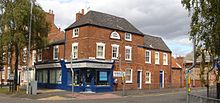 Margaret Thatcher’s birthplace, in Grantham
Margaret Thatcher’s birthplace, in Grantham
Thatcher was born Margaret Hilda Roberts in Grantham, Lincolnshire, on 13 October 1925. Her father was Alfred Roberts, originally from Northamptonshire, and her mother was Beatrice Ethel (née Stephenson) from Lincolnshire. She spent her childhood in Grantham, where her father owned two grocery shops. She and her older sister Muriel were raised in the flat above the larger of the two, located near the railway line. Her father was active in local politics and the Methodist church, serving as an aldermanand a local preacher, and brought up his daughter as a strict Methodist. He came from a Liberal family but stood—as was then customary in local government—as an Independent. He was Mayor of Grantham in 1945–46 and lost his position as alderman in 1952 after the Labour Party won its first majority on Grantham Council in 1950.
Margaret Roberts attended Huntingtower Road Primary School and won a scholarship to Kesteven and Grantham Girls’ School. Her school reports showed hard work and continual improvement; her extracurricular activities included the piano, field hockey, poetry recitals, swimming and walking. She was head girl in 1942–43. In her upper sixth year she applied for a scholarship to study chemistry at Somerville College, Oxford, but she was initially rejected and was offered a place only after another candidate withdrew. She arrived at Oxford in 1943 and graduated in 1947 with Second-Class Honours in the four-year Chemistry Bachelor of Science degree; in her final year she specialised in X-ray crystallography under the supervision of Dorothy Hodgkin.
Roberts became President of the Oxford University Conservative Association in 1946. She was influenced at university by political works such as Friedrich von Hayek‘s The Road to Serfdom (1944), which condemned economic intervention by government as a precursor to an authoritarian state.
After graduating, Roberts moved to Colchester in Essex to work as a research chemist for BX Plastics. She joined the local Conservative Association and attended the party conference at Llandudno in 1948, as a representative of the University Graduate Conservative Association. One of her Oxford friends was also a friend of the Chair of the Dartford Conservative Association in Kent, who were looking for candidates. Officials of the association were so impressed by her that they asked her to apply, even though she was not on the Conservative party’s approved list: she was selected in January 1951 and added to the approved list post ante. At a dinner following her formal adoption as Conservative candidate for Dartford in February 1951 she met Denis Thatcher, a successful and wealthy divorced businessman, who drove her to her Essex train. In preparation for the election Roberts moved to Dartford, where she supported herself by working as a research chemist for J. Lyons and Co. in Hammersmith, part of a team developing emulsifiers for ice cream.
Early political career
In the 1950 and 1951 general elections, she was the Conservative candidate for the safe Labour seat of Dartford, where she attracted media attention as the youngest and the only female candidate. She lost both times to Norman Dodds, but reduced the Labour majority by 6,000, and then a further 1,000. (By an odd coincidence, Edward Heath was elected for the first time in the neighbouring constituency in 1950). During the campaigns, she was supported by her parents and by Denis Thatcher, whom she married in December 1951. Denis funded his wife’s studies for the bar; she qualified as a barrister in 1953 and specialised in taxation. That same year her twins, Carol and Mark, were born.
Member of Parliament (1959–1970)
Thatcher was not a candidate in the 1955 general election as it came fairly soon after the birth of her children. Later that year, she was narrowly defeated when she sought selection as the candidate for the Orpington by-election, 1955. Afterwards, she began looking for a Conservative safe seat and was selected as the candidate for Finchley in April 1958 (narrowly beating Ian Montagu Fraser). She was elected as MP for the seat after a hard campaign in the 1959 election. Her maiden speech was in support of her private member’s bill (Public Bodies (Admission to Meetings) Act 1960), requiring local authorities to hold their council meetings in public. In 1961 she went against the Conservative Party’s official position by voting for the restoration of birchingas a judicial corporal punishment. She regarded Finchley’s Jewish residents as “her people” and became a founding member of the Anglo-Israel Friendship League of Finchley as well as a member of the Conservative Friends of Israel. She also believed Israel had to trade land for peace, and condemned Israel’s 1981 bombing of Osirak as “a grave breach of international law.”
In October 1961 Thatcher was promoted to the front bench as Parliamentary Undersecretary at the Ministry of Pensions and National Insurance in Harold Macmillan‘s administration. After the Conservatives lost the 1964 election she became spokeswoman on Housing and Land, in which position she advocated her party’s policy of allowing tenants to buy their council houses. She moved to the Shadow Treasury team in 1966 and, as Treasury spokeswoman, opposed Labour’s mandatory price and income controls, arguing that they would produce effects contrary to those intended and distort the economy.
At the Conservative Party Conference of 1966 she criticised the high-tax policies of the Labour Government as being steps “not only towards Socialism, but towards Communism.” She argued that lower taxes served as an incentive to hard work. Thatcher was one of the few Conservative MPs to support Leo Abse‘s Bill to decriminalise male homosexuality. She voted in favour of David Steel‘s bill to legalise abortion, as well as a ban on hare coursing. She supported the retention of capital punishment and voted against the relaxation of divorce laws.
In 1967, she was selected by the United States Embassy in London to take part in the International Visitor Leadership Program(then called the Foreign Leader Program), a professional exchange programme that gave her the opportunity to spend about six weeks visiting various US cities and political figures as well as institutions such as the International Monetary Fund. Later that year Thatcher joined the Shadow Cabinet, where she was appointed Fuel and Power spokesman by opposition leader Edward Heath. Shortly before the 1970 general election, she was promoted to Shadow Transport spokesman and later to Education.
Education Secretary and Cabinet Minister (1970–1974)
The Conservative party under Edward Heath won the 1970 general election, and Thatcher was subsequently appointed to the Cabinet as Secretary of State for Education and Science. During her first months in office she attracted public attention as a result of the administration’s attempts to cut spending. She gave priority to academic needs in schools and imposed public expenditure cuts on the state education system, resulting in the abolition of free milk for schoolchildren aged seven to eleven. She held that few children would suffer if schools were charged for milk, but she agreed to provide younger children with a third of a pint daily, for nutritional purposes. Her decision provoked a storm of protest from the Labour party and the press, leading to the moniker “Margaret Thatcher, Milk Snatcher.” Cabinet papers of the time reveal that Thatcher actually opposed the policy but was forced into it by the Treasury. Thatcher wrote in her autobiography: “I learned a valuable lesson [from the experience]. I had incurred the maximum of political odium for the minimum of political benefit.” It remains popular belief that Thatcher abolished free school milk for all ages. In fact milk for secondary school pupils was abolished by Edward Short, her predecessor as Education Secretary, while free milk for infants was abolished by Shirley Williams.
Thatcher’s term of office was marked by proposals for more local education authorities to close grammar schools and to adopt comprehensive secondary education. Although she was committed to a tiered secondary modern-grammar school system of education and was determined to preserve grammar schools, during her tenure as Education Secretary she turned down only 326 of 3,612 proposals for schools to become comprehensives; the proportion of pupils attending comprehensive schools consequently rose from 32 per cent to 62 per cent.
Leader of the Opposition (1975–1979)
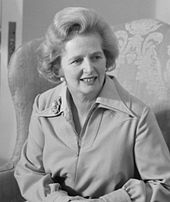 Margaret Thatcher, Leader of the Opposition, 18 September 1975
Margaret Thatcher, Leader of the Opposition, 18 September 1975
The Heath government continued to experience difficulties with oil embargoes and union demands for wage increases in 1973 and lost the February 1974 general election. Labour formed a minority government and went on to win a narrow majority in the October 1974 general election. Heath’s leadership of the Conservative Party looked increasingly in doubt. Thatcher was not initially the obvious replacement, but she eventually became the main challenger, promising a fresh start. Her main support came from the Conservative 1922 Committee. She defeated Heath on the first ballot and he resigned the leadership. In the second ballot she defeated Heath’s preferred successor, William Whitelaw, and became party leader on 11 February 1975; she appointed Whitelaw as her deputy. Heath remained disenchanted with Thatcher to the end of his life, for what he and many of his supporters perceived as her disloyalty in standing against him.
Thatcher began to attend lunches regularly at the Institute of Economic Affairs (IEA), a think tank founded by the poultry magnate Antony Fisher, a disciple of Friedrich von Hayek; she had been visiting the IEA and reading its publications since the early 1960s. There she was influenced by the ideas of Ralph Harris and Arthur Seldon, and she became the face of the ideological movement opposing the welfare state. Keynesian economics, they believed, was weakening Britain. The institute’s pamphlets proposed less government, lower taxes, and more freedom for business and consumers.
The television critic Clive James, writing in The Observer during the voting for the leadership, compared her voice of 1973 to a cat sliding down a blackboard. Thatcher had already begun to work on her presentation on the advice of Gordon Reece, a former television producer. By chance Reece met the actor Laurence Olivier, who arranged lessons with the National Theatre‘s voice coach. Thatcher succeeded in completely suppressing her Lincolnshire dialect except when under stress, notably after provocation from Denis Healey in the House of Commons in April 1983, when she accused the Labour front bench of beingfrit.
On 19 January 1976 Thatcher made a speech in Kensington Town Hall in which she made a scathing attack on the Soviet Union:
“The Russians are bent on world dominance, and they are rapidly acquiring the means to become the most powerful imperial nation the world has seen. The men in the Soviet Politburo do not have to worry about the ebb and flow of public opinion. They put guns before butter, while we put just about everything before guns.”
In response, the Soviet Defence Ministry newspaper Krasnaya Zvezda (Red Star) called her the “Iron Lady,” a sobriquet she gladly adopted.
In mid-1978, the economy began to improve and opinion polls showed Labour in the lead, with a general election being expected later that year and a Labour win a serious possibility. Prime Minister James Callaghan surprised many by announcing on 7 September that there would be no general election that year and he would wait until 1979 before going to the polls. Thatcher reacted to this by branding the Labour government as “chickens”, and Liberal Party leader David Steel joined in, criticising Labour for “running scared.”
The Labour government then faced fresh public unease about the direction of the country and a damaging series of strikes during the winter of 1978–79, dubbed the “Winter of Discontent.” The Conservatives attacked the Labour government’s unemployment record, using advertising with the slogan Labour Isn’t Working. A general election was called after James Callaghan‘s government lost a motion of no confidence in early 1979. The Conservatives won a 44-seat majority in the House of Commons, and Margaret Thatcher became the UK’s first female Prime Minister.
Prime Minister (1979–1990) – Main article: Premiership of Margaret Thatcher
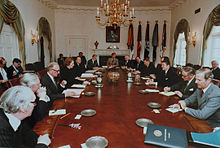 Thatcher’s Cabinet meets with Reagan’s Cabinet at the White House, 1981
Thatcher’s Cabinet meets with Reagan’s Cabinet at the White House, 1981
Thatcher became Prime Minister on 4 May 1979. Arriving at 10 Downing Street, she said, in a paraphrase of the “Prayer of Saint Francis:”
“Where there is discord, may we bring harmony. Where there is error, may we bring truth. Where there is doubt, may we bring faith. And where there is despair, may we bring hope.”
Domestic affairs
Thatcher was Leader of the Opposition and Prime Minister at a time of increased racial tension in Britain. Commenting on the local elections of May 1977, The Economist noted “The Tory tide swamped the smaller parties. That specifically includes the National Front, which suffered a clear decline from last year.” Her standing in the polls rose by 11 percent after a January 1978 interview for World in Action in which she said “the British character has done so much for democracy, for law and done so much throughout the world that if there is any fear that it might be swamped people are going to react and be rather hostile to those coming in.”; and “in many ways [minorities] add to the richness and variety of this country. The moment the minority threatens to become a big one, people get frightened.” In the 1979 General Election, the Conservatives attracted voters from the National Front, whose support almost collapsed. In a meeting in July 1979 with Lord Carrington (the Foreign Secretary) and William Whitelaw (Home Secretary) she objected to the number of Asian immigrants, in the context of limiting the number of Vietnamese boat people allowed to settle in the UK to fewer than 10,000.
As Prime Minister, Thatcher met weekly with Queen Elizabeth II to discuss government business, and their relationship came under close scrutiny. In July 1986, The Sunday Times reported claims attributed to the Queen’s advisers of a “rift” between Buckingham Palace and Downing Street “over a wide range of domestic and international issues.” The Palace issued an official denial, heading off speculation about a possible constitutional crisis. After Thatcher’s retirement a senior Palace source again dismissed as “nonsense” the “stereotyped idea” that she had not got along with the Queen, or that they had fallen out over Thatcherite policies. Thatcher later wrote: “I always found the Queen’s attitude towards the work of the Government absolutely correct … stories of clashes between ‘two powerful women’ were just too good not to make up.”
In August 1989, Thatcher queried her government’s response to the Taylor Report, writing a hand-written comment on a Downing Street briefing note: “The broad thrust is devastating criticism of the police. Is that for us to welcome? Surely we welcome the thoroughness of the report and its recommendations?”
During her time in office, Thatcher practised great frugality in her official residence, including insisting on paying for her own ironing-board.
Economy and taxation
Thatcher’s economic policy was influenced by monetarist thinking and economists such as Milton Friedman and Alan Walters. Together with Chancellor of the Exchequer Geoffrey Howe, she lowered direct taxes on income and increased indirect taxes. She increased interest rates to slow the growth of the money supply and thereby lower inflation, introduced cash limits on public spending, and reduced expenditure on social services such as education and housing. Her cuts in higher education spending resulted in her being the first Oxford-educated post-war Prime Minister not to be awarded an honorary doctorate by the University of Oxford, after a 738 to 319 vote of the governing assembly and a student petition. Her new centrally funded City Technology Colleges did not enjoy much success, and the Funding Agency for Schools was set up to control expenditure by opening and closing schools; the Social Market Foundation, a centre-left think tank, described it as having “an extraordinary range of dictatorial powers.”
Foreign affairs
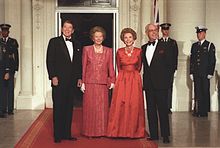 The Thatchers with the Reagans standing at the North Portico of the White House before a state dinner, 16 November 1988
The Thatchers with the Reagans standing at the North Portico of the White House before a state dinner, 16 November 1988
Thatcher took office in the penultimate decade of the Cold War and became closely aligned with the policies of United States President Ronald Reagan, based on their shared distrust of Communism, although she strongly opposed Reagan’s October 1983 invasion of Grenada. Reagan had assured Thatcher that an invasion was not contemplated, and thereafter Thatcher felt she could never fully trust Reagan again. During her first year as Prime Minister she supported NATO‘s decision to deploy US nuclear cruise and Pershing missiles in Western Europe and permitted the US to station more than 160 cruise missiles at RAF Greenham Common, starting on 14 November 1983 and triggering mass protests by the Campaign for Nuclear Disarmament. She bought the Trident nuclear missile submarine system from the US to replace Polaris, tripling the UK’s nuclear forces at an eventual cost of more than £12 billion (at 1996–97 prices). Thatcher’s preference for defence ties with the US was demonstrated in the Westland affair of January 1986, when she acted with colleagues to allow the struggling helicopter manufacturer Westland to refuse a takeover offer from the Italian firm Agusta in favour of the management’s preferred option, a link with Sikorsky Aircraft Corporation. The UK Defence Secretary, Michael Heseltine, who had supported the Agusta deal, resigned in protest.
On 2 April 1982 the ruling military junta in Argentina ordered the invasion of the British-controlled Falkland Islands and South Georgia, triggering the Falklands War. The subsequent crisis was “a defining moment of her [Thatcher’s] premiership.” At the suggestion of Harold Macmillan and Robert Armstrong, she set up and chaired a small War Cabinet (formally called ODSA, Overseas and Defence committee, South Atlantic) to take charge of the conduct of the war, which by 5–6 April had authorised and dispatched a naval task force to retake the islands. Argentina surrendered on 14 June and the operation was hailed a success, notwithstanding the deaths of 255 British servicemen and 3 Falkland Islanders. Argentinian deaths totalled 649, half of them after the nuclear-powered submarine HMS Conqueror torpedoed and sank the cruiser ARA General Belgrano on 2 May. Thatcher was criticised for the neglect of the Falklands’ defence that led to the war, and notably by Tam Dalyell in parliament for the decision to sink the General Belgrano, but overall she was considered a highly capable and committed war leader. The “Falklands factor”, an economic recovery beginning early in 1982, and a bitterly divided opposition contributed to Thatcher’s second election victory in 1983. Thatcher often referred after the war to the “Falklands Spirit”; Hastings and Jenkins (1983) suggested that this reflected her preference for the streamlined decision-making of her War Cabinet over the painstaking deal-making of peace-time cabinet government.
In September 1982 she visited the People’s Republic of China to discuss with Deng Xiaoping the sovereignty of Hong Kong after 1997. China was the first communist state Thatcher had visited and she was the first British prime minister to visit China. Throughout their meeting, she sought the PRC’s agreement to a continued British presence in the territory. Deng stated clearly the PRC’s sovereignty on Hong Kong was non-negotiable, but he was willing to settle the sovereignty issue with Britain through formal negotiations, and both governments promised to maintain Hong Kong’s stability and prosperity. After the two-year negotiations, Thatcher made concession to the PRC government and signed the Sino-British Joint Declaration in Beijing in December 1984, handing over Hong Kong’s sovereignty in 1997.
Although saying that she was in favour of “peaceful negotiations” to end apartheid, Thatcher stood against the sanctions imposed on South Africa by the Commonwealth and the EC. She attempted to preserve trade with South Africa while persuading the regime there to abandon apartheid. This included “[c]asting herself as President Botha’s candid friend”, and inviting him to visit the UK in June 1984, in spite of the “inevitable demonstrations” against his regime. Thatcher, on the other hand, dismissed the African National Congress (ANC) in October 1987 as “a typical terrorist organisation.”
The Thatcher government supported the Khmer Rouge keeping their seat in the UN after they were ousted from power in Cambodia by the Cambodian–Vietnamese War. Although denying it at the time they also sent the SAS to train the non-Communist members of of the CGDK to fight against the Vietnamese-backed People’s Republic of Kampucheagovernment.
Thatcher’s antipathy towards European integration became more pronounced during her premiership, particularly after her third election victory in 1987. During a 1988 speech in Bruges she outlined her opposition to proposals from the European Community (EC), forerunner of the European Union, for a federal structure and increased centralisation of decision making. Thatcher and her party had supported British membership of the EC in the 1975 national referendum, but she believed that the role of the organisation should be limited to ensuring free trade and effective competition, and feared that the EC’s approach was at odds with her views on smaller government and deregulation; in 1988, she remarked, “We have not successfully rolled back the frontiers of the state in Britain, only to see them re-imposed at a European level, with a European super-state exercising a new dominance from Brussels.” Thatcher was firmly opposed to the UK’s membership of the Exchange Rate Mechanism, a precursor to European monetary union, believing that it would constrain the British economy, despite the urging of her Chancellor of the Exchequer Nigel Lawson and Foreign Secretary Geoffrey Howe, but she was persuaded by John Major to join in October 1990, at what proved to be too high a rate.

